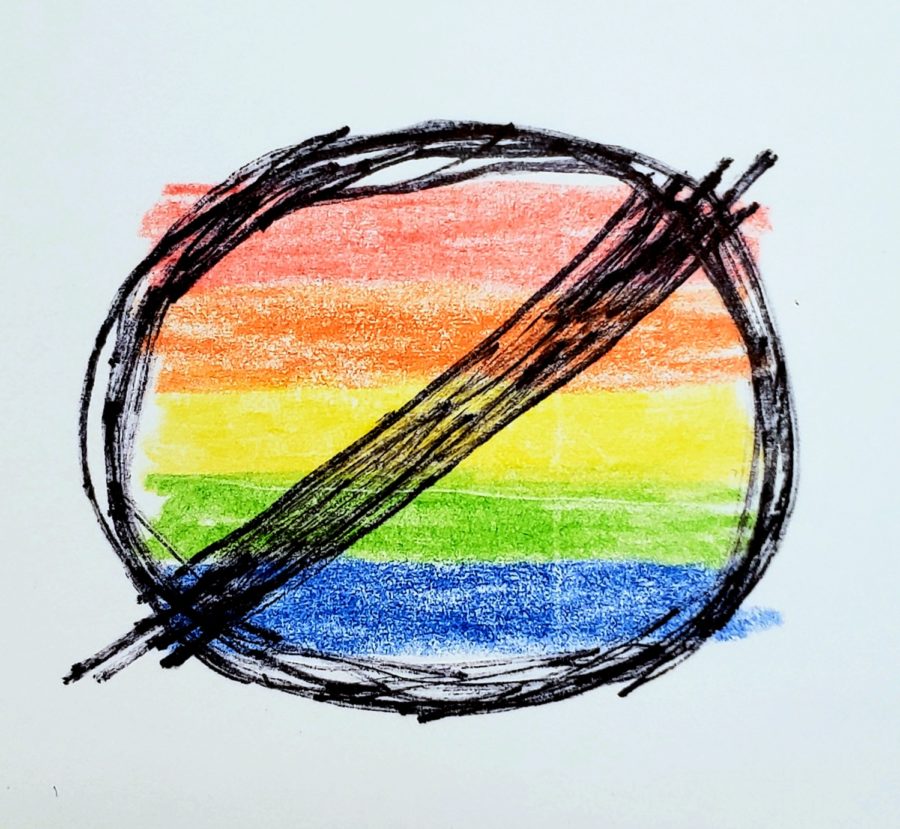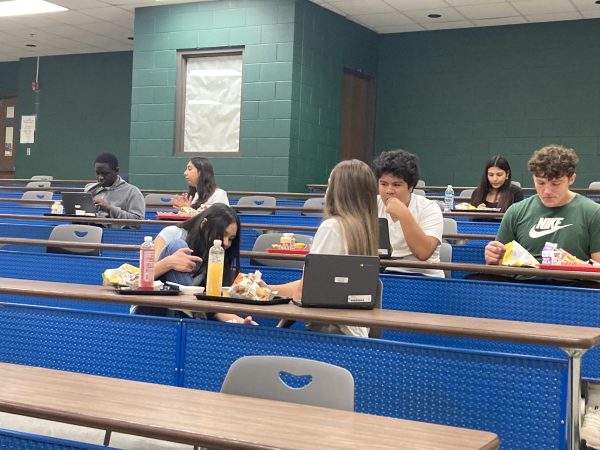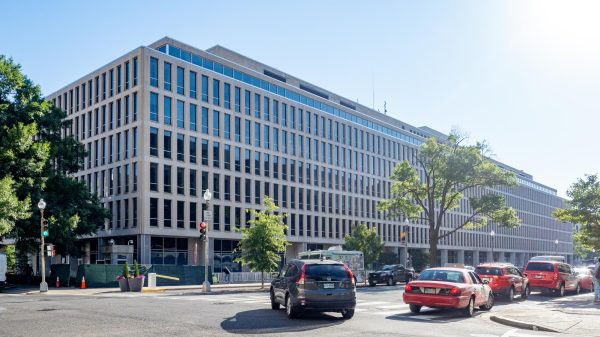LGBTQIA+ Lives are in Danger!
With recent bills being passed by legislation, the basic human rights that the community had to fight to obtain are being taken away once again.
As of recent, LGBTQIA+ lives have been put at risk due to an intense onslaught of discrimination against them. This community’s rights are being taken away as more and more bills are passed by multiple state governments.
“We’re going backward in society,” Allison Miranda-Castro said. “I have friends who are trans, genderfluid, etc. If these laws pass, they’re going to be affected greatly. This scares me but not as much as it fills me with a heated rage.”
States have advanced a record number of measures in recent years that challenge LGBTQIA+ rights, particularly those of transgender children. The ACLU is keeping tabs on these assaults and coordinating solidarity for LGBTQIA+ persons all over the world through our nationwide network of affiliates.
“I feel disappointed in recent laws passed against the LGBTQ+ community,” Olivia Ramirez said. “Recently there have been laws regarding transgender people and whether they should be allowed to get gender reassignment surgery. Although this doesn’t affect me, it affects my friends and others. I feel bad that people aren’t able to be themselves because lawmakers feel they have the right to pass laws that don’t affect them.”
Tennessee Gov. Bill Lee signed into law a ban on all forms of gender-affirming care for transgender people under 18 today, restricting the freedom of families of transgender youth to seek essential health care. This puts the government in charge of making crucial decisions that are typically made by parents in Tennessee. On July 1st, 2023, the statute became operative.
Trans adolescents who were already getting gender-affirming medical care as of July 1, 2023, will be required to stop receiving it in Tennessee as of March 31, 2024, under the new law. By July 1, 2023, children who are not receiving medical treatment will be unable to start receiving care in Tennessee.
“I have faced many forms of discrimination since I came out 4 years ago,” Oliver Pense said. “A couple of years ago I was bullied due to the fact I am transgender. I have also been subject to online harassment for being a part of the LGBTQ+ community.”
This was only the beginning, future bills have already or are in the process of being passed. SB 184, SB 1138, and HB 1041 are just a few of the many bills that have been introduced. These bills will affect the LGBTQIA+ community’s rights such as their free speech, healthcare, public accommodations, school and education, and IDs.
“In my personal opinion I think things could get worse for the community,” Ramirez said. “With laws being passed discriminating towards same-sex marriage, trans people, adoption for same-sex couples, etc. the community is being torn apart. The community is also being misinterpreted and grouped with individuals who don’t represent the LGBTQ+ community.”
This type of legislation makes an effort to weaken and undermine anti-discrimination laws by allowing companies, hospitals, and even employers to reject or treat LGBTQIA+ individuals differently.
Politicians are attempting to regulate how and when LGBTQIA+ people can be themselves, to restrict access to literature about them, and to ban or censor acts like drag shows, despite the protections of the First Amendment’s right to free expression.
“The only place I feel I can really be myself is within my own home,” Ramirez said. “I am lucky to have an accepting mother and siblings but I don’t feel as free as I do in other places such as school, restaurants, and the community.”
This legislation aims to give transgender persons access to medically necessary health care, such as Medicaid. Numerous of these measures forbid providing affirming treatment for transgender children and may result in criminal consequences. These laws exempt intersex children from receiving the same therapies that are mandated for cisgender children. Some measures forbid insurance companies from covering the costs of transgender patients’ medical care or prohibit funding for hospitals that provide care that is gender-affirming.
Legislation pertaining to public accommodations aims to ban transgender persons from utilizing facilities like locker rooms and public restrooms. These areas ought to be open to everyone, regardless of gender identity or gender expression. You can’t completely engage in work, school, and public life if you can’t use the restroom.
State legislators are attempting to ban any in-class discussions of LGBTQIA+ individuals and issues, require teachers to out kids, and prevent trans pupils from participating in school activities like athletics. All pupils should be protected and supported in our schools so they may learn and succeed, not be restricted in terms of resources, education, or opportunities.
“The entire LGBTQ+ community, as well as supporters and allies, should be doing everything in their power to prevent more Anti-LGBT bills from being passed,” Pense said. “The safety of every person in the community is dependent on having safe spaces that allow them to be themselves.”
These proposals aim to restrict the ability to change gender information on identification documents and records, like birth certificates and licenses. This increases the likelihood of job loss, discrimination, and other negative consequences for transgender people. To travel, apply for jobs, and go into public places without fear of harassment or danger, trans, intersex, and nonbinary people require identification cards that truly reflect who they are.
“It’s hard to say if things will get better or worse, only time will tell,” Miranda-Castro said. “Although it seems to be heading in a negative direction. The governors are oppressing our communities’ rights as we speak.”
Some have begun to view these attacks as a build-up to genocide. There are 10 stages of genocide; classification, symbolization, discrimination, dehumanization, organization, polarization, preparation, persecution, extermination, and denial. It seems that the LGBTQIA+ community, specifically transgender, is in stage six, polarization.
Extremists driving the groups apart, hate groups disseminating polarizing information, laws prohibiting intermarrying or social interaction, and extremist terrorism targeting moderates scaring and silencing the center are all examples of polarization.
There are many different ‘movements’ that are happening to separate and split the LGBTQIA+ community. The LGB without the T is one of the many organizations that are being created in order to separate and drive the LGBTQIA+ community apart.
“I feel that the LGB (no T) movement is unfair and isn’t what the community stands for at all,” Ramirez said. “We’re supposed to be accepting of everyone and everything, but by excluding trans people we are being like those that aren’t accepting of us. Trans people have faced the same hardships we have and should be accepted into the community.”
Miranda adds on by stating what the community needs to do in order to move forward.
“The community should move forward by taking a step back and looking at everything that’s happening,” Miranda-Castro said. “There are so many protests going on to stop these laws, people are getting hurt, and people are speaking out. The community is strong and it shouldn’t try to break away anyone who is included. It’s called LGBTQ+ for a reason. They should try their best to speak against the government and diminish these laws. As well as stop trying to separate trans people from their group. That’s what the government wants. We must stand together instead of tearing each other apart if we want to continue living our lives.”
With all this going on, the community has been suffering many negative side effects. According to research, 45% of LGBTQIA+ youth have thought about suicide in the past year and LGBTQIA+ youth are almost 4x times more likely to consider suicide than their straight, cisgender classmates. Suicidality is influenced by a number of factors, such as prejudice, homophobia, violence, gender nonconformity, societal views and supportive policies, family, religious persecution, and a toxic educational environment.
“Moving forward the community should be less judgemental and more accepting of those who they may view as different from them,” Ramirez said. “Sometimes all someone needs is to feel wanted in their environment.”
Your donation will support the student journalists of Logansport High School. Your contribution will allow us to purchase equipment and cover our annual website hosting costs.

Freshman Maddison Sell (all pronouns) is a reporter and a member of the class of 2026. She joined Magpie their freshman year (2022-23). One of his favorite...











